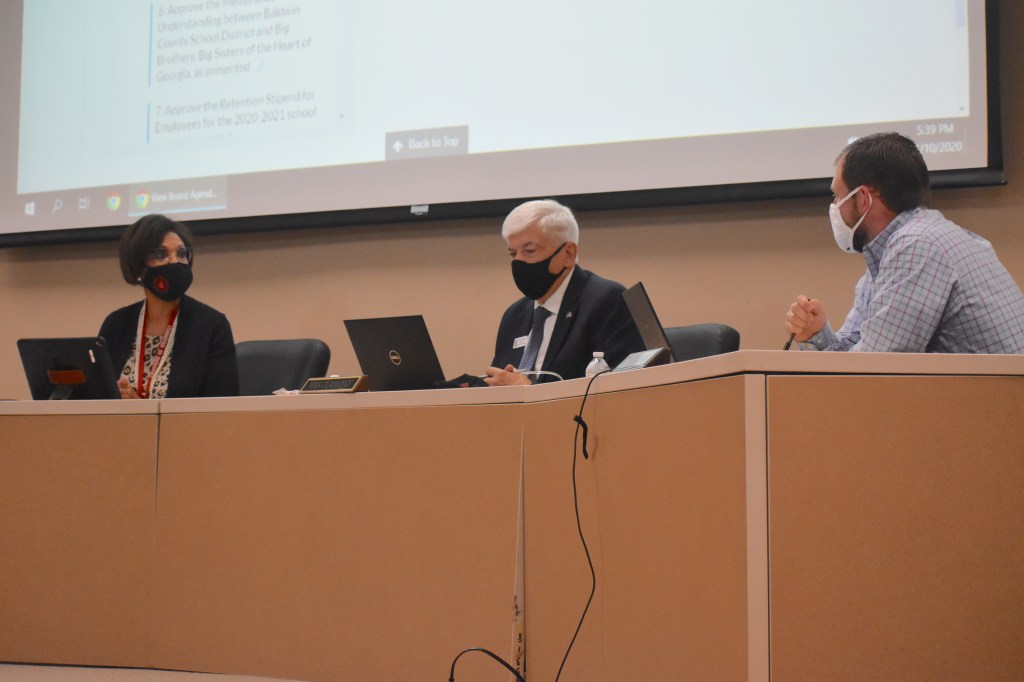BOE: No returning to in-person school after third 9 weeks
Published 12:00 pm Tuesday, November 24, 2020

- Superintendent Dr. Noris Price (left) discusses the return of students for the second nine weeks of school and also students coming back after the Christmas holiday break at the November board meeting.
Baldwin County School District students who do not opt for in-person instruction for the third nine weeks will remain virtual learners for the entire 2020-21 academic year, a Nov. 10 school board ruling states.
Trending
The recommendation came from Baldwin County School Superintendent Dr. Noris Price.
“After talking with the principals, we felt that we needed to stop the enrollment after the third nine weeks,” Price told board members. “It would be challenging to have children that have been out all year come back for the end of the school year when we’re getting ready for testing.”
In-person instruction will still be done for the fourth nine weeks, but only for those students who started face-to-face learning at the start of the third nine weeks or before.
The ruling applies only to K-8 students since high schoolers could only the start the year in person in August or after the holiday break in January due to semester block scheduling.
Only 1,560 Baldwin County students opted for traditional in-person instruction to begin the current academic year. Elementary and middle schoolers could return to school buildings at the start of the second nine weeks, which began Oct. 21. Now about a month into that term, face-to-face enrollment sits at just over 2,400 students. Baldwin County’s total K-12 enrollment is around 5,000 students, so more than half are still attending virtually through the school system’s online platform, Baldwin Online Academy.
“We believe that Baldwin Online Academy is going to become more relevant than ever, and we will never go back to having the majority of our kids come to school in-person,” the superintendent said. “I think that you’re going to have more and more people exercise the right to learn virtually.”
Trending
Right now the local public school system is facing some challenges keeping virtual students engaged, according to discussion at this month’s board meeting. Some older children have taken on jobs and are prioritizing making money over their education.
“I believe that we’re going to see the impact of this pandemic for at least two to three years out,” Price said. “What we’re trying to do is not lose a generation of students. With some of them, it’s been hard. Our teachers, administrators and district staff are working together to try to get our students engaged… We’re doing everything in our power to continue to ensure that they (students) understand the importance of participating on a daily basis in the lessons that have been prepared for them.”
Testing change discussed by Georgia BOE
Mandated testing has been at the forefront of public educators’ minds lately, both at the state and local levels.
America’s school systems were given federal waivers to forego assessments in the spring after COVID hit. A similar waiver was requested for the 2020-21 year since schools and students are still feeling the effects of the pandemic. That second waiver was denied by the United States Department of Education, meaning end-of-course (EOC) Milestones tests will be administered to high schoolers in the coming weeks. States do have the flexibility to lessen the amount these tests affect students’ final grades, though. In Georgia, that figure is normally 20 percent.
The state Board of Education met Wednesday and Thursday to discuss and vote on a proposal to decrease the amount to 10 percent. After hearing many public comments and much feedback saying that number was still too high, an amendment was brought forward to make Milestones count for just .01 percent of the final grade. The amended agenda item was passed by a 10-3 tally, but because it was a different figure from the one posted to the set agenda, it must sit on the table for 30 days and come back to a final vote. That would lessen the impact of Milestones tests and also allow virtual students who are uncomfortable coming to school to skip testing and not have their grades significantly impacted.
These assessments must be taken in-person inside a school building as they are proctored. The state board also said that if .01 percent is adopted, it would serve as a floor and local school boards could increase the percentage if they so choose.
The Georgia Board of Education will hold a called meeting once the 30 days are up to decide whether or not the .01 percent floor will stand. Even though the date will be after a bulk of end-of-course assessments are given, school systems can change the testing weight in students’ final grades after the fact.
Dr. Price said in a Thursday email to The Union-Recorder that she is on the same page as State School Superintendent Richard Woods who is very opposed to administering standardized tests at all during the ongoing pandemic. Since school systems’ hands are tied federally though, Price and other local school officials and administrators will take these next 30 days to discuss options pertaining to the mandated testing.
Superintendent Woods was very much in favor of lowering EOC weights to .01 percent since the assessment waiver was not granted federally. He proposed that figure to the state school board last month, but it was rejected in a split vote. GaDOE put out a survey so students, educators and parents could give their feedback on the matter, and they were overwhelmingly in favor of the .01 percent. Out of over 93,000 respondents more than 86 percent chose .01 while 11.3 percent selected 10 percent for EOC weight and just 2.3 percent said the weight should remain at 20.
“I appreciate the State Board of Education hearing and responding to the clear will of the people on this issue, and hope that will continue with a vote to approve the .01% recommendation in December,” Superintendent Woods said in a Thursday press release. “My position on this has not changed: it is logistically, pedagogically, and morally unreasonable to administer high-stakes standardized tests in the middle of a pandemic. If the federal government is going to continue insisting on the administration of these exams, it is incumbent on us at the state level to ensure they are not high-stakes and do not penalize students and teachers for circumstances beyond their control.”
Gov. Brian Kemp also issued a statement in support of setting an EOC weight floor for the current school year.
“The decision by the State School Board to add an additional 30 days to the public comment period and allow End of Course tests to be weighted at a minimum of .01 percent gives our school systems the flexibility they need to make the best decisions for their students during these unprecedented times,” Kemp said. “Our local leaders in education work hard every day to ensure a brighter future for children in every community across the Peach State, and I have full confidence they will continue to put hardworking students and teachers first.”
No decision has been made about the end-of-grade Milestones assessments administered to the lower grades each spring.





